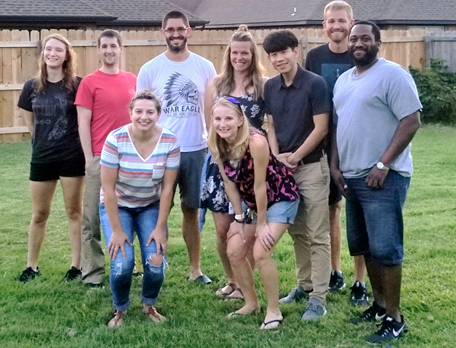
University of Arkansas exercise science professors Nicholas Greene and Tyrone Washington have received a $1.6 million National Institutes of Health grant.
The five-year Research Project Grant (R01) focuses on preventing cancer cachexia, a wasting syndrome that largely affects the muscles, along with other body tissues, and is present in up to 80% of cancer patients.
"This grant is a testament to the high quality, high impact research that Drs. Greene, Washington and their collaborators perform," said Matthew Ganio, head of the Department of Health, Human Performance and Recreation in the College of Education and Health Professions. "They are making important advances in the field that will eventually lead to better health outcomes in cancer patients."
Washington said the funding will allow the U of A Cachexia Research Laboratory to conduct cutting edge research and expose undergraduate and graduate students to meaningful work.
"I am very excited about the opportunity to train students to conduct high-quality research in the field of cancer cachexia and skeletal muscle," he said.
Depending on the type of cancer, cachexia is estimated to cause between 20 and 40 percent of cancer-related deaths.
"In our studies we will be looking to examine events occurring in the muscle prior to the onset of cachexia in order to identify mechanisms that can be targeted to develop preventative measures," Greene said.
Wasting associated with cancer makes treatments difficult as many of the treatments for cancer are especially difficult on the total body. Maintaining the rest of body health is critical to successful treatment, he said.
Greene said development of muscle wasting is also a major indicator of poor treatment outcomes in multiple other diseases. Certain medications or exercises may be key to preventing this, he said.
Greene, who teaches and conducts research in exercise science in the College of Education and Health Professions, directs the Cachexia Research Laboratory in the Exercise Science Research Center at the U of A. He will serve as lead researcher on the grant project with assistance from Washington; Tim Muldoon and Chris Nelson, associate professor and assistant professor, respectively, of biomedical engineering in the U of A College of Engineering; Wen-Juo Lo, an associate professor in the Educational Statistics and Research Methodology program in the U of A College of Education and Health Professions; Michael Wiggs, an assistant professor in the Health, Human Performance and Recreation department at Baylor University; Dustin Patterson, assistant professor at the University of Texas at Tyler; and Jarrod Call, an associate professor in the Department of Kinesiology at the University of Georgia.
Topics
Contacts
Shannon G. Magsam, director of communications
College of Education and Health Professions
479-575-3138,